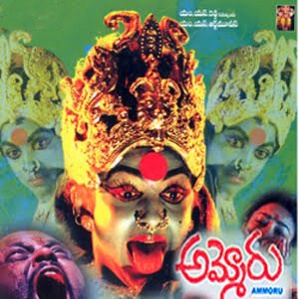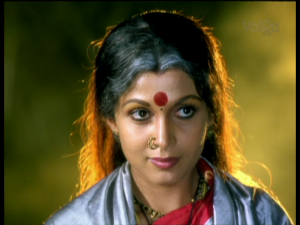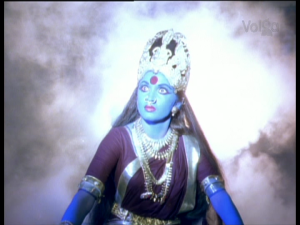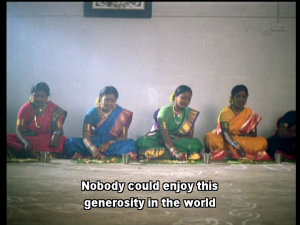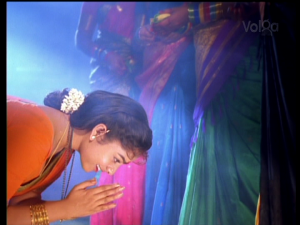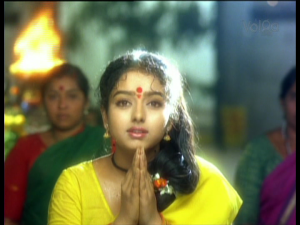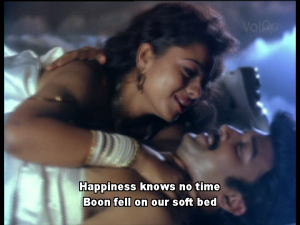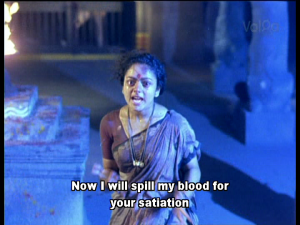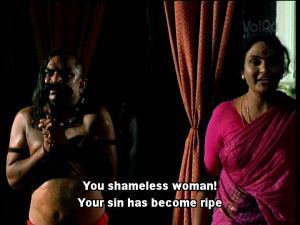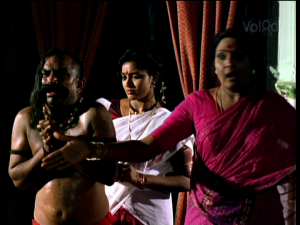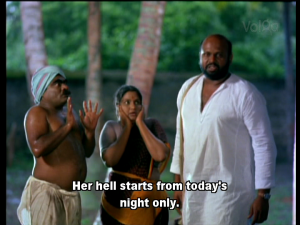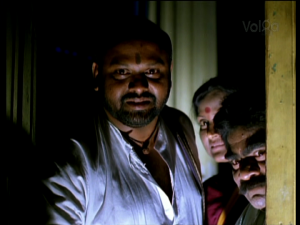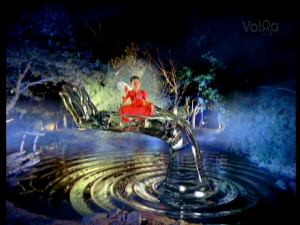
Karthik Subbaraj’s third film is rather darker than his previous two, with less comedy and a serious theme about women who have to endure the poor decisions of weak men. It’s a film where the female characters are defined by the men, and the story is told through male eyes although the women generally are stronger and less flawed than their husbands. While the relationships are the core of the film, there is an overlying story that involves theft, murder and deception and although it’s another excellent film from Karthik, I kept thinking throughout that this would have been more powerful if he had shown more of the women’s viewpoint. However, highlighting the flaws in his male characters and ensuring that they don’t appear heroic is in itself a departure from the norm in Indian cinema, as is focusing on the plight of the women trapped in realistically troubled relationships. In Iraivi, Karthik has made another film that is not easy to define but one which will hopefully start conversations and make audiences think a little harder about the definition of abuse.
The film starts and ends with the women, even beginning and finishing with the same image of a hand outstretched in the rain. The rain is used throughout as a metaphor for freedom, with each of the women expressing a wish to stand in the rain and get ‘drenched’. In the images and dialogue shown over the opening credits, Ponni (Anjali) is a schoolgirl, with the acknowledged somewhat old-fashioned dream of making a good marriage and living the rest of her life in domestic bliss. Vazhini (Kamalinee Mukherjee) is shown to be a strong and confident woman who has defied her family to marry the man she loves while Meenakshi (Vadivukkarasi) is upset by her husband’s demeaning attitude towards her, which has been an unceasing constant throughout their life together.
When we next see Yazhini and Meenakshi, each has been changed by the men around them, while we get to see Ponni’s transformation during the story. Meenakshi has had some kind of fall and/or stroke. She is reaction-less in a bed in hospital and her two sons, Arul (S.J. Surya) and Jagan (Bobby Simha) blame their father Dass (Radha Ravi). He admits to being the cause of his wife’s hospitalisation, but despite the fact that she never moves and never speaks, Meenakshi has become their focus for any of the problems Arul and Jagan face. No matter that she cannot communicate, she is still their mother and that bond is as strong as always.
Yazhini is married to Arul, a film director whose last film is being held hostage by his producer after the two had a falling out. Arul is living in limbo until he can secure his film’s release and has become an alcoholic as a result. He gets into fights in bars when drunk but is not physically abusive to his wife and daughter, but instead subjects them to his mood swings and depression, and the general uncertainty of living with an alcoholic. S.J. Surya is excellent in his portrayal of a weak and selfish man who cannot cope with his loss and has become bitter and completely self-absorbed in his misery. Kamalini too is very good in a role that captures well how many women become trapped by their circumstances. She threatens Arul with divorce but at the same time still loves her husband and tries very hard to be as supportive as she can. However, Arul’s alcoholism and refusal to move beyond his own self-pity makes it difficult for Yazhini to see any other recourse other than to leave, taking their daughter with her. The dialogues between the two are excellent, and the sense of frustration and despair from both Arul and Yazhini underpins every scene. As the story unfolds, it’s Yazhini who emerges as the winner, able to change and adapt she moves on with her life while Arul is stuck in the same self-destructive pattern. Even after going to rehab, his selfish nature has not changed and everything is still about getting his film released – even losing his wife isn’t enough of a jolt to dislodge him from the familiar rut of self-pity and single-minded focus on his film above all else.
Michael (Vijay Sethupathi) grown up with Arul and Jagan and considers them as family with Arul as his best friend. He is in love with a young widow Malar (Pooja Dewariya) but she has no interest in anything other than a physical relationship and rejects his proposals of marriage. Malar is an interesting character – she is a woman who knows what she wants and is not bothered about societies perception of her behaviour, but I felt that there was something rather contrived about her character and despite Pooja’s best efforts, Malar didn’t quite ring true for me compared to the other characters.
When Michael’s parents arrange a marriage with Ponni he callously informs her on their wedding night that he has been forced into the marriage and can never be the man of her dreams. Her female relatives advise her that this is usually the case, but that Michael will change with marriage, however when Ponni tries to engage with Michael he shuts her out at every opportunity. In almost every scene with Michael or Ponni there are background details or snippets of dialogue which seem to foreshadow their relationship. When it seems that Ponni’s preganancy might be the turning point in their relationship, Michael is arrested and sent to prison, leaving Ponni to deliver and bring up her baby by herself. It’s again brilliantly written to illustrate the effect on Ponni as the happy-go-lucky school girl is transformed into a weary and accepting mother, managing to cope as best she can. Anjali is fantastic throughout and the dialogue again is perfectly written to illustrate the difficulties of women in what is a fairly typical relationship, no matter where in the world or whatever the cultural background. Vijay Sethupathi is on top form too as a man who is easily led by his friends and finds it difficult to admit to mistakes, even though at heart he isn’t a bad person.
The third character in the story is less successful, and Bobby Simha never quite manages to make his Jagan as believable as the other two. Jagan is jealous of Michael as he loves Ponni himself and decides to do something about it when he sees her distress when Michael goes to jail. Ponni’s reaction is certainly not what I expected in a film, but it is what could happen in real life, whereas Jegan’s monologues about the oppression of women and the evils of society seem more filmi and contrived than likely to occur in reality. However, Jagan does give an interesting contrast to the other two men, and is a more typical film character while providing the overlying story of artefact theft and deception against which the various relationships are all developed.
The story meanders about haphazardly while establishing the main characters and displaying their motivations. There are repeated themes and foreshadowing of events to come, but the final outcome is difficult to predict and the twists along the way are unexpected and genuinely surprising. What stands out are the individual performances from S.J Surya, Vijay Sethupathi, Kamalinee Murkharjee and Anjali, all of whom are superb. There is able support from all the other actors including a restrained appearance from Karunakaran as Arul’s friend Ramesh. The background music from Santhosh Narayanan is effective and the songs good, although in general these don’t add anything to the film. Sivakumar Vijayan’s cinematography is outstanding, often using the lighting to heighten the drama while ensuring that every scene is perfectly arranged for maximum impact.
Karthik has payed exquisite attention to detail, and the set-up and execution of every scene is beautifully planned to deliver maximum impact. On repeated watching, the small details start to emerge and the links between events become clearer. It’s a film that actually becomes better the second and third time around and I suspect that every time I watch Iraivi there will be another detail I missed the first time. It’s not perfect however; the film is long and some of the diversions taken don’t add anything worthwhile to the story, while despite starting off well, the female characters start to lose some of their definition and eventually only react to the actions of the men. It’s still an intriguing film and one I highly recommend for a different look at relationships between men and women. 4½ stars.








































